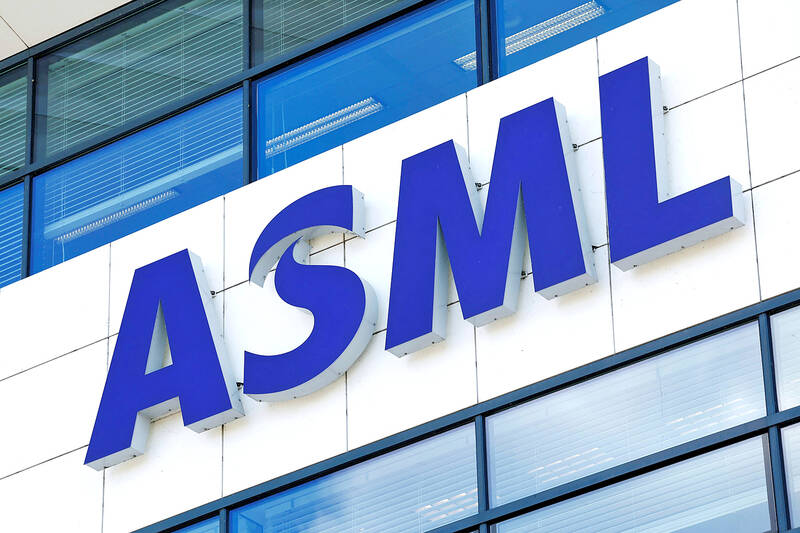ASML Holding NV’s order intake plunged in the third quarter amid a sector-wide slump in the semiconductor industry, leaving the company increasingly reliant on revenue from China.
Order bookings fell 42 percent to 2.6 billion euros (US$2.8 billion) in the July-to-September period from the previous quarter, Europe’s most valuable technology company said in a statement yesterday.
That compared with an average estimate of 4.5 billion euros among analysts polled by Bloomberg.

Photo: Reuters
While ASML maintains a sizeable order backlog, the semiconductor industry has been experiencing a slowdown after inflation and recession fears hit consumer spending.
Slumping demand elsewhere made China ASML’s biggest market last quarter, overtaking Taiwan.
ASML, which is the only producer of the lithography equipment needed to make the most advanced semiconductors, has experienced a jump in business from China this year as chipmakers there boosted orders ahead of looming export controls.
“All in all, on the macro front it’s quite dynamic and quite challenging,” ASML chief financial officer Roger Dassen said in a video interview on the results. “If you then specifically look into the semiconductor industry, I think it’s plain to say that our customers are really going through the cycle trough.”
China accounted for 46 percent of ASML’s sales in the third quarter, compared with 24 percent in the previous quarter and 8 percent in the January-to-March period.
Taiwan was 24 percent, down from 34 percent in the second quarter.
ASML has been targeted by the US effort to curb exports of cutting-edge technology to China.
Earlier this year, US President Joe Biden’s administration convinced the Dutch government to prevent ASML from shipping some immersion deep ultraviolet lithography machines, its second-most advanced product line, to China without a license.
The Dutch restrictions are set to take full effect from Jan. 1.
The US on Tuesday announced additional export curbs that are designed to block China’s access to advanced semiconductor technology.
ASML said the new measures would affect its sales there in the medium to long term.
ASML is already barred from selling its most advanced equipment, known as extreme ultraviolet machines, to China.
The firm has said that it does not expect the Dutch and US measures to have a material impact on its financial outlook for the year or in the longer term.
ASML’s revenue next year is expected to be similar to this year, Dassen said.
“On the other hand, we believe 2024 is going to be a pivotal year in preparing us for what we think will be very significant growth in 2025,” he said.
Revenue is on track for 6.7 billion euros to 7.1 billion euros in the fourth quarter, compared with net sales of 6.7 billion euros in the previous period, the company said.
The forecast compares with analysts’ average estimate of 6.91 billion euros, a Bloomberg survey showed.
“We continue to see the industry as being in the early stages of a new upcycle, with industry fundamentals and ASML’s orders expected to steadily improve,” Jefferies analyst Janardan Menon said in an e-mailed note.

When an apartment comes up for rent in Germany’s big cities, hundreds of prospective tenants often queue down the street to view it, but the acute shortage of affordable housing is getting scant attention ahead of today’s snap general election. “Housing is one of the main problems for people, but nobody talks about it, nobody takes it seriously,” said Andreas Ibel, president of Build Europe, an association representing housing developers. Migration and the sluggish economy top the list of voters’ concerns, but analysts say housing policy fails to break through as returns on investment take time to register, making the

NOT TO WORRY: Some people are concerned funds might continue moving out of the country, but the central bank said financial account outflows are not unusual in Taiwan Taiwan’s outbound investments hit a new high last year due to investments made by contract chipmaker Taiwan Semiconductor Manufacturing Co (TSMC, 台積電) and other major manufacturers to boost global expansion, the central bank said on Thursday. The net increase in outbound investments last year reached a record US$21.05 billion, while the net increase in outbound investments by Taiwanese residents reached a record US$31.98 billion, central bank data showed. Chen Fei-wen (陳斐紋), deputy director of the central bank’s Department of Economic Research, said the increase was largely due to TSMC’s efforts to expand production in the US and Japan. Investments by Vanguard International

WARNING SHOT: The US president has threatened to impose 25 percent tariffs on all imported vehicles, and similar or higher duties on pharmaceuticals and semiconductors US President Donald Trump on Wednesday suggested that a trade deal with China was “possible” — a key target in the US leader’s tariffs policy. The US in 2020 had already agreed to “a great trade deal with China” and a new deal was “possible,” Trump said. Trump said he expected Chinese President Xi Jinping (習近平) to visit the US, without giving a timeline for his trip. Trump also said that he was talking to China about TikTok, as the US seeks to broker a sale of the popular app owned by Chinese firm ByteDance Ltd (字節跳動). Trump last week said that he had

STRUGGLING TO SURVIVE: The group is proposing a consortium of investors, with Tesla as the largest backer, and possibly a minority investment by Hon Hai Precision Nissan Motor Co shares jumped after the Financial Times reported that a high-level Japanese group has drawn up plans to seek investment from Elon Musk’s Tesla Inc to aid the struggling automaker. The group believes the electric vehicle (EV) maker is interested in acquiring Nissan’s plants in the US, the newspaper reported, citing people it did not identify. The proposal envisions a consortium of investors, with Tesla as the largest backer, but also includes the possibility of a minority investment by Hon Hai Precision Industry Co (鴻海精密) to prevent a full takeover by the Apple supplier, the report said. The group is